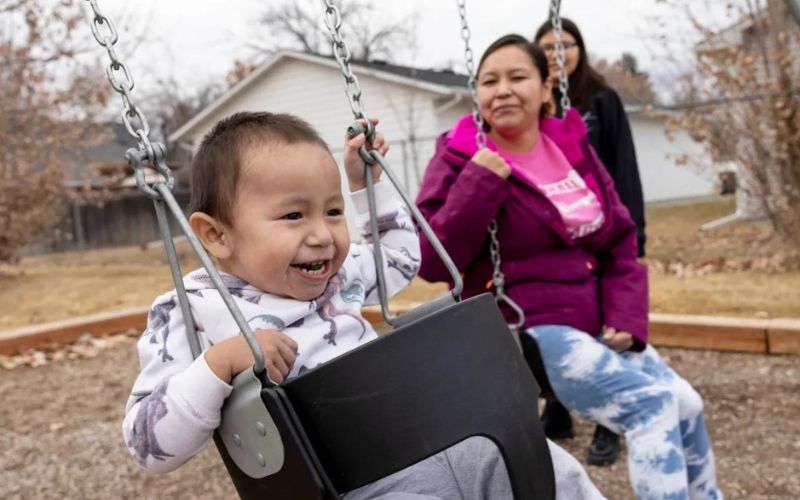
- Details
- By Mara Silvers, Montana Free Press
Native American children make up more than a third of the foster care caseload in Montana, despite representing less than 10% of the state’s child population. While there’s a broad consensus among child welfare experts that this outsized representation is a problem, there exists no collective strategy to address it. The Montana Free Press series Keeping the Kids, supported by a data fellowship through the USC Annenberg Center for Health Journalism, explores the available data and highlights examples of local solutions around the state. This article focuses on one specialized recovery court working with families in Billings.
This article was originally published in the Montana Free Press.
When Katarina Stewart appeared for a routine court appointment in December, the Yellowstone County judge asked a question familiar to parents appearing in the Indian Child Welfare Act Family Recovery Court: How are the kids?
Stewart, 32, started with the positive. One of her children had a band concert the following day. Another had made a new best friend at school. But she also shared concerns. She was worried about her youngest child after a persistent lung problem had sent them back to the hospital, she told the court. A new air purifier in their apartment seemed to be helping, she said, but her child’s medical conditions weren’t resolved.
The room was filled with case workers, peer support specialists, treatment professionals, probation and parole officers, public defenders and attorneys — all “team members” of this Family Recovery Court for parents navigating cases subject to the federal Indian Child Welfare Act, or ICWA. About a dozen other parents participating in the court-run program, all women, filled the benches behind Stewart, listening to her check-in and waiting their turn.
Judge Rod Souza stood behind a podium, standing on the same level as the table where Stewart was seated, less removed than his usual seat slightly elevated over the Billings courtroom.
The founder of the first Montana court designed to implement ICWA, Souza listened carefully and asked thoughtful questions about Stewart’s day-to-day routine. About how she was juggling her work schedule with her child’s frequent visits to the doctor. About her ongoing recovery from substance use disorder. About the complexities of applying for food assistance.
As the check-in came to an end, Souza offered a message that could serve as the treatment court’s unofficial motto.
“I know you can do it,” he said. He and every other court team member clapped, and Stewart returned to sit among her peers on the courtroom benches.
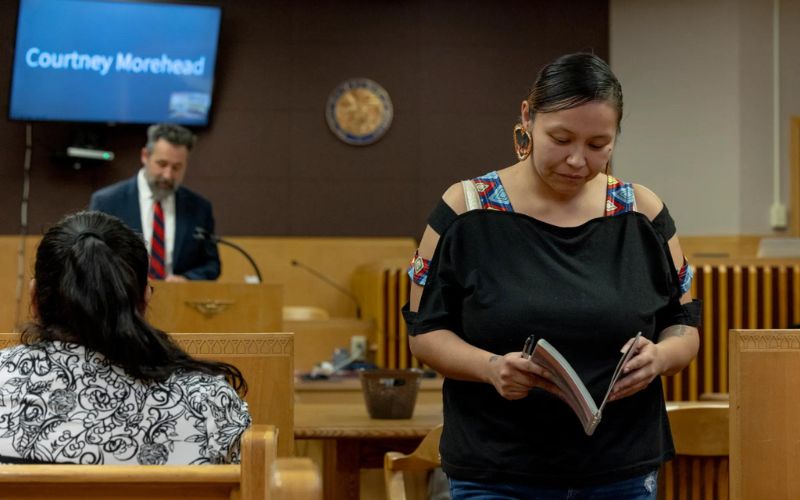 Katarina Stewart returns to her seat in treatment court after meeting with Judge Rod Souza for the Indian Child Welfare Act Family Recovery Court in Billings on Jan. 3, 2024. Credit: Tailyr Irvine / MTFP
Katarina Stewart returns to her seat in treatment court after meeting with Judge Rod Souza for the Indian Child Welfare Act Family Recovery Court in Billings on Jan. 3, 2024. Credit: Tailyr Irvine / MTFP
December marked nearly two and a half years of these types of conversations between Souza and Stewart, a member of the Crow Tribe and Billings resident. She originally entered the court’s supervision in 2021 after her four children were removed by state child protection specialists for suspected mistreatment. With the court’s help, Stewart began an intensive treatment program for her alcohol use, appeared for regular check-ins with Souza, and was reunited with three of her children roughly seven months after they were first separated. The youngest of the four, less than a year old at the time, remained with Stewart’s parents through a voluntary arrangement.
Over the last few years, she said, the court’s structure and assistance have helped Stewart tend to her mental health and sobriety and start a new chapter as an engaged, empowered parent. She once viewed the court’s requirements — checking in for drug tests, being on time, not missing appointments — as hoops to jump through. Now, they are expectations she holds for herself.
“It started turning into, ‘I’m doing all of this for myself, now.’ I’ll get up to do a [test] because it gives me accountability that I am sober,” Stewart said. The court helped her stop avoiding her depression and turning away from the addiction treatment and parenting support that, Stewart said, “I didn’t feel like I deserved.”
“All the accountability has helped me bloom to where I am,” she said. She’s slated to graduate from court at the end of February.
The Family Recovery Court, a specialized track for parents involved in ICWA-eligible child welfare cases, launched in 2021 with more than $600,000 in federal grant support and the encouragement of community groups who wanted to better serve Native families navigating the local legal system.
The court’s model is long-term. It includes five phases, ranging from stabilization to recovery management, and participants typically stay in the program for more than a year. It expects participants to meet firm, no-nonsense requirements, but also provides a constellation of resources to support their success, consistent encouragement from court staff and peer support from other parents.
Of the 10 parents currently participating, including Stewart, six have so far been reunited with their children, with a seventh hosting regular overnight visits with her kids as an interim step. By that standard, the Billings court is fulfilling one of the fundamental aims of the decades-old Indian Child Welfare Act: keeping Native children with their parents whenever possible, prioritizing placements with family or close friends as the next-best option, and collaborating with tribal governments throughout the duration of child protection cases.
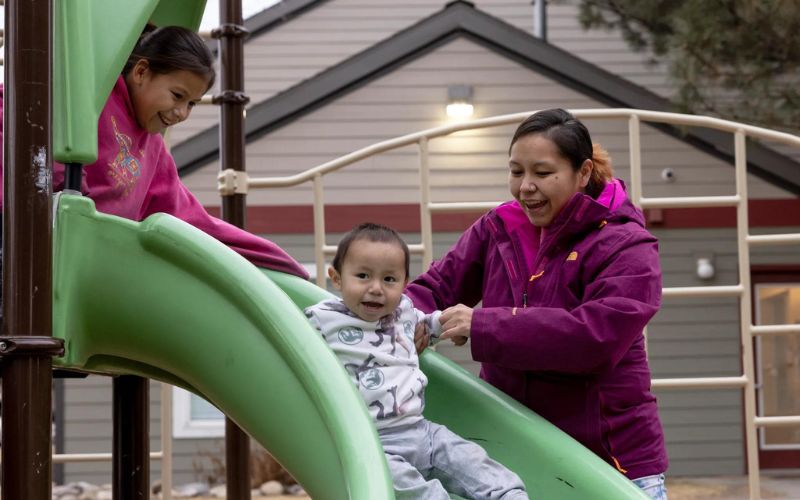 Katarina Stewart and her children Josette and Donovan play in the park at her apartment complex in Billings on Jan. 3, 2024. Credit: Tailyr Irvine / MTFP
Katarina Stewart and her children Josette and Donovan play in the park at her apartment complex in Billings on Jan. 3, 2024. Credit: Tailyr Irvine / MTFP
Neither ICWA nor its influence on eligible child protection cases in Montana is new. The federal policy, which some supporters call “the gold standard” in child welfare law, dates to 1978, when Congress responded to the widespread practice of Native American and Alaska Native children being removed from their families and communities by non-tribal members and governmental authorities.
The act was reaffirmed by the U.S. Supreme Court in June 2023, the same year the Montana Legislature’s American Indian Caucus helped carry and steer a state-level version of the same law through the Republican-led session to further codify its protections for tribal nations and families.
The Supreme Court’s ruling, authored by Justice Amy Coney Barrett, reflected on the motivation behind 1978 law and its enduring relevance.
“Congress found that many of these children were being ‘placed in non-Indian foster and adoptive homes and institutions,’ and that the States had contributed to the problem by ‘fail[ing] to recognize the essential tribal relations of Indian people and the cultural and social standards prevailing in Indian communities and families,’” Barrett wrote. “This harmed not only Indian parents and children, but also Indian tribes. As Congress put it, ‘there is no resource that is more vital to the continued existence and integrity of Indian tribes than their children.’”
Despite the law’s longevity, Montana’s adherence to ICWA’s goals and principles varies across the state, according to local child welfare experts. District courts, county prosecutors and the state health department lack a consistent statewide method for tracking ICWA cases and their outcomes. Federal data similarly struggles to convey how Montana is or is not meeting specific benchmarks of the statute, including placement of tribally enrolled or enrollable children with family members, kin, or in other preferred settings.
Of all children in foster care in Montana in 2021 whose most recent placement was with relatives, 53% were white and 31% were Native American, according to an analysis of federal data by the national research organization Child Trends.
 The sun rises over Billings on Jan. 3, 2024. Credit: Tailyr Irvine / MTFP
The sun rises over Billings on Jan. 3, 2024. Credit: Tailyr Irvine / MTFP
Other home settings — including those with fellow tribal members and close family friends or community members — can also qualify as a “preferred placement” under ICWA. In 2021, about 43% of Native youth in foster care in Montana stayed with a Native family during their first foster care placement, according to a Montana Free Press analysis of federal data. For Native children subsequently moved to a second home, placement with a Native foster family was more rare, happening for only about 28% of Native children that year.
ICWA also applies to how children exit the foster care system. Upon leaving care, 48% percent of Native youth in 2021 were reunified with their parents or a primary caretaker, a decrease from about 62% in 2017, according to five years of the most recently available data collected by the federal Children’s Bureau. The percentage of white children exiting foster care into reunification was higher, by comparison, but also dropped slightly in recent years, from about 70% in 2017 to 66% in 2021.
Placements in long-term guardianships, often with family members or close friends — an outcome that can avoid termination of parental rights and often aligns with ICWA practices — have increased for both racial groups over the same time period. A larger percentage of Native American children, 25%, left foster care for a guardianship placement in 2021, compared to less than 14% of white children, according to the Children’s Bureau.
ICWA requires caseworkers and courts to make “active efforts” to communicate with family members, connect parents with relevant resources, and find appropriate foster care placements when necessary. That mandate applies to every ICWA case in Montana and elsewhere, but advocates say adherence is more likely in a court specifically dedicated to upholding the law’s principles.
Souza’s ICWA court, founded in 2017, is one of two such courts in Montana — the second was founded in Missoula in 2020. The newer ICWA Family Recovery Court in Billings is currently unique among Montana state courts. To some child welfare experts familiar with the model, the Billings ICWA courts show what the act’s “active efforts” requirement looks like in practice.
“I’m a huge, huge fan of the ICWA court because they are actually working with the families. Working with the tribes. They’re doing a collaborative approach,” said Maylinn Smith, managing attorney in the tribal prosecutor’s office of the Confederated Salish and Kootenai Tribes and a former co-director of the Margery Hunter Brown Indian Law Clinic at the University of Montana. “I think those are the kinds of services that are the most helpful.”
Reunifications and family guardianships are also taking place in Souza’s broader ICWA caseload outside of the designated treatment court, according to a review of the judge’s 132 cases from 2021, the most recent year for which a substantial survey of outcomes is available. Though a quarter of those cases remained unresolved as of January 2024, 43% had been dismissed, largely because of reunification, and 24% had ended in guardianship.
Only eight children’s cases from that year, 6% of the overall caseload, resulted in termination of parental rights and permanent legal custody with a non-family party. Souza said the final placements for four of those children were in line with ICWA “preferred placements.” The other four outcomes departed from that preference, he said, “based on the unavailability of a suitable placement despite the diligent search of the social worker.”
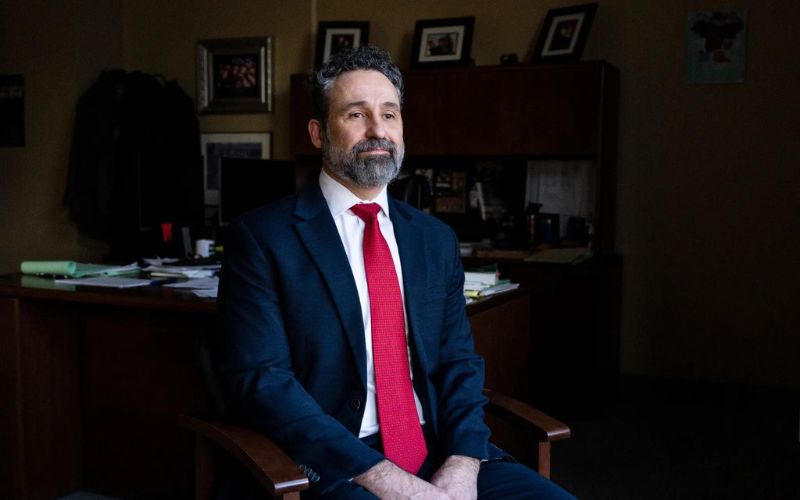 Judge Rod Souza poses for a portrait in his chambers on Jan. 4, 2024, in Billings. Credit: Tailyr Irvine / MTFP
Judge Rod Souza poses for a portrait in his chambers on Jan. 4, 2024, in Billings. Credit: Tailyr Irvine / MTFP
In interviews with MTFP, staff members of the Billings court took pride in the rarity of terminating parental rights and the overall emphasis on reunification. But that’s not to say the work is easy. For some participating parents, regaining and maintaining custody of their children has required substantial life changes and perseverance.
Elizabeth Harris, a member of the Northern Cheyenne Tribe who lives in Billings, told MTFP that she began her time in Souza’s court in 2021 when she was still grappling with an addiction to methamphetamine.
“I was at a point in my life where I had nothing. I lost everything. I lost my sanity, my dignity, I just didn’t care,” Harris said in a December interview. Her oldest son had run away while they were temporarily staying in a homeless shelter, she recounted, prompting the state to open a child protection case. When she went to the child welfare offices in downtown Billings and asked for help, the caseworkers directed her to go watch a day of proceedings in the ICWA Family Recovery Court.
“They said, ‘Well, you have an observation [scheduled] for Judge Souza’s court. And you need to be there this Friday,’” Harris recalled. “I observed. I had a treatment date. And I just fully surrendered. I really did.”
There were many days when she wanted to try to drop out of the court-ordered programming entirely, Harris said, believing she wasn’t “good enough” to be a parent. But slowly she began to regard the staff of Souza’s treatment court as members of her support team, and started to get her health and her life in order.
In the years since, the court has helped Harris reunite with her oldest son, move into an apartment she likes, get a driver’s license, find steady employment, maintain her sobriety, and strengthen her relationship with her younger children, who are currently in the care of their grandparents. The process hasn’t been smooth or easy, she said, but the court has stuck with her throughout.
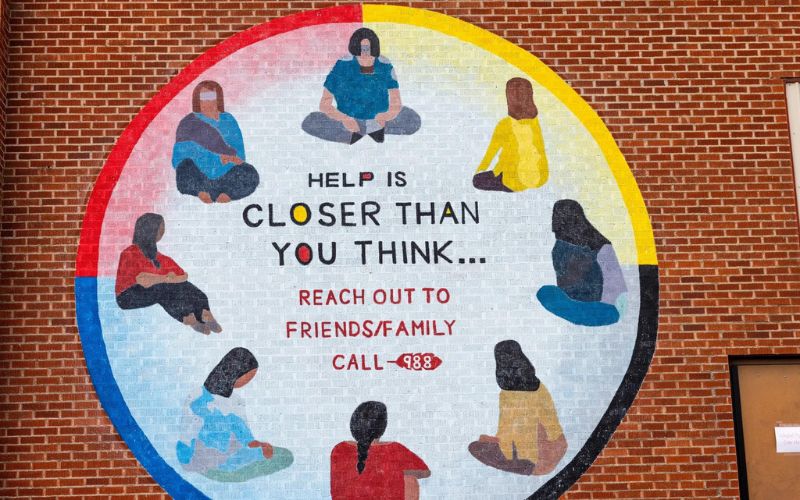 A mural on the Billings Urban Indian Health and Wellness Center on Jan. 4, 2024. Credit: Tailyr Irvine / MTFP
A mural on the Billings Urban Indian Health and Wellness Center on Jan. 4, 2024. Credit: Tailyr Irvine / MTFP
In interviews with MTFP, staff members of the Billings court took pride in the rarity of terminating parental rights and the overall emphasis on reunification. But that’s not to say the work is easy. For some participating parents, regaining and maintaining custody of their children has required substantial life changes and perseverance.
Elizabeth Harris, a member of the Northern Cheyenne Tribe who lives in Billings, told MTFP that she began her time in Souza’s court in 2021 when she was still grappling with an addiction to methamphetamine.
“I was at a point in my life where I had nothing. I lost everything. I lost my sanity, my dignity, I just didn’t care,” Harris said in a December interview. Her oldest son had run away while they were temporarily staying in a homeless shelter, she recounted, prompting the state to open a child protection case. When she went to the child welfare offices in downtown Billings and asked for help, the caseworkers directed her to go watch a day of proceedings in the ICWA Family Recovery Court.
“They said, ‘Well, you have an observation [scheduled] for Judge Souza’s court. And you need to be there this Friday,’” Harris recalled. “I observed. I had a treatment date. And I just fully surrendered. I really did.”
There were many days when she wanted to try to drop out of the court-ordered programming entirely, Harris said, believing she wasn’t “good enough” to be a parent. But slowly she began to regard the staff of Souza’s treatment court as members of her support team, and started to get her health and her life in order.
In the years since, the court has helped Harris reunite with her oldest son, move into an apartment she likes, get a driver’s license, find steady employment, maintain her sobriety, and strengthen her relationship with her younger children, who are currently in the care of their grandparents. The process hasn’t been smooth or easy, she said, but the court has stuck with her throughout.
During a January court appearance, one woman broke down crying in front of the judge, frustrated by the requirements of her residential treatment program and what she perceived as her case’s ever-extending reunification timeline. She had decided to give up parental rights to her daughter entirely, she told Souza, saying she was seen as “a bad parent” in the eyes of the court and state child protective workers.
“I have no connection with her no more. She might as well be better off with some people who ain’t addicts. Who ain’t me,” she said through tears. “Who already are grown up. Who already have stability.”
In front of the full but silent courtroom, Souza urged her to reconsider. He described the surrender of her rights as a “rash decision” and advised her to discuss it further with her attorneys, case managers and the state health department.
“You’re being really hard on yourself,” he said. “Everyone in here has had an issue with addiction,” he added before asking other parents sitting in the rows of court benches to offer their perspectives. “That doesn’t mean you’re not capable of being a parent.”
“It sounds like you’re trying to give up on yourself right now,” another parent said. “And that’s really heartbreaking because you’re a good woman and a good mom.”
Recovery is challenging, the peer continued, as are the court’s expectations, but both are worth seeing through.
“There’s a whole different life out there that we haven’t gotten to live,” she said.
It’s not only Souza and peer parents helping court participants navigate the hurdles of the child welfare system. In addition to the full-time treatment court coordinator, the court’s only full-time employee, the ICWA recovery court team comprises more than a dozen professionals from state and county agencies, tribal governments, and local treatment and mental health care providers, as well as case management staff from the Billings Urban Indian Health and Wellness Center and court-appointed special advocates, or CASAs.
Team members describe the entire coalition as essential to putting ICWA into action for each family member who walks through the door.
“We’re meeting these parents where they’re at and helping them overcome barriers,” said Brooke Baracker-Taylor, an assistant attorney general with the state Department of Justice’s Child Protection Unit and one of the founding team members of both the Billings ICWA court and the Family Recovery Court. “That’s really what it’s all about, in my opinion.”
Baracker-Taylor attributed the court’s growth and sustainability to Souza’s judicial leadership, the commitment of local community organizations, and a strong belief in the principles of ICWA — attributes that could be replicated in other judicial districts, she said.
“We didn’t have a cent to start the regular ICWA court. It was a group of professionals that said, let’s do something different. And who were passionate, not only about the letter of the law, but the spirit [of it],” Baracker-Taylor said. “I don’t think [ICWA] can function the way it should function, in my opinion, without that understanding and desire.”
The court primarily works with ICWA cases involving members of the Fort Peck Assiniboine and Sioux Tribes, the Northern Cheyenne Tribe and the Crow Tribe. For these nearby tribal nations, the existence of a dedicated ICWA court in Billings demonstrates the court staff’s respect for tribal sovereignty and a local commitment to upholding the federal law.
Each tribal nation has a dedicated ICWA agent responsible for coordinating with non-tribal authorities on cases that are subject to the federal law, a job that can be challenging if non-tribal case workers or court staff don’t understand ICWA’s rules.
“It’s really hard. Like the cases back east, they don’t really know ICWA,” said Rebecca Buffalo, the ICWA agent for the Crow Tribe, in a November interview. In counties that neighbor the reservation, including Big Horn and Yellowstone, she said, the working relationship is easier. State workers typically make a concerted effort to consult with the tribe about preferred placements and whether a family member or close friend can take the child.
“If they remove a child, they usually go to us first. They go through us and ask us,” she said.
Under ICWA, tribes also have the authority to transfer an off-reservation child welfare case involving a tribal member to tribal court for adjudication. But transferring a case to the reservation is not always judged to be in the child’s best interest, Buffalo continued, especially if more services and resources are available to them in Billings or another town outside the tribe’s jurisdiction.
Harris and Stewart both expressed a desire for a similar kind of family treatment court in their respective home communities, where addiction treatment, housing, child care and health care resources can be hard to find. They both say they know parents they think could benefit from the Billings court’s approach to recovery and parenting.
“I think Judge Souza’s whole court should go back to my reservation and start there,” Harris said. “Because it really rebuilt me from being completely broken, completely lost, to just loving myself and being able to love my kids … I’ve never thought I would be where I am today.”
Stewart, speaking about her experiences as her youngest child babbled excitedly in the background, also reflected on how the court has helped her grow as a parent. She used to avoid talking about her mental health with anyone, let alone a therapist, opting instead to “hide,” she said. From people trying to hold her accountable. From the demands of day-to-day parenting. From her own mental health challenges. But now she’s moved away from those old habits and is taking steps to show up differently for herself and her kids.
“You need to talk to somebody in order to air out whatever’s happening inside, festering … I don’t hide in my apartment anymore,” she said. “I usually raise the curtains. Let the sun in.”
Stewart doesn’t know how her case might have ended up if she hadn’t gotten involved in the Billings ICWA treatment court. It gave her the time and space to dig into the roots of her substance use and make concerted changes over time.
She reflected some surprise that Souza’s court is the only one like it in the state, and said she hoped it might inspire other state and tribal court systems to start similar programs.
“I feel like there should be more programs like this outside of Billings,” she said, including back on the Crow Reservation where she used to live. “Because there’re a lot of families down there who lose their kids and they never get their kids back.”
Help us defend tribal sovereignty.
At Native News Online, our mission is rooted in telling the stories that strengthen sovereignty and uplift Indigenous voices — not just at year’s end, but every single day.
Because of your generosity last year, we were able to keep our reporters on the ground in tribal communities, at national gatherings and in the halls of Congress — covering the issues that matter most to Indian Country: sovereignty, culture, education, health and economic opportunity.
That support sustained us through a tough year in 2025. Now, as we look to the year ahead, we need your help right now to ensure warrior journalism remains strong — reporting that defends tribal sovereignty, amplifies Native truth, and holds power accountable.
 The stakes couldn't be higher. Your support keeps Native voices heard, Native stories told and Native sovereignty defended.
The stakes couldn't be higher. Your support keeps Native voices heard, Native stories told and Native sovereignty defended.
Stand with Warrior Journalism today.
Levi Rickert (Potawatomi), Editor & Publisher
